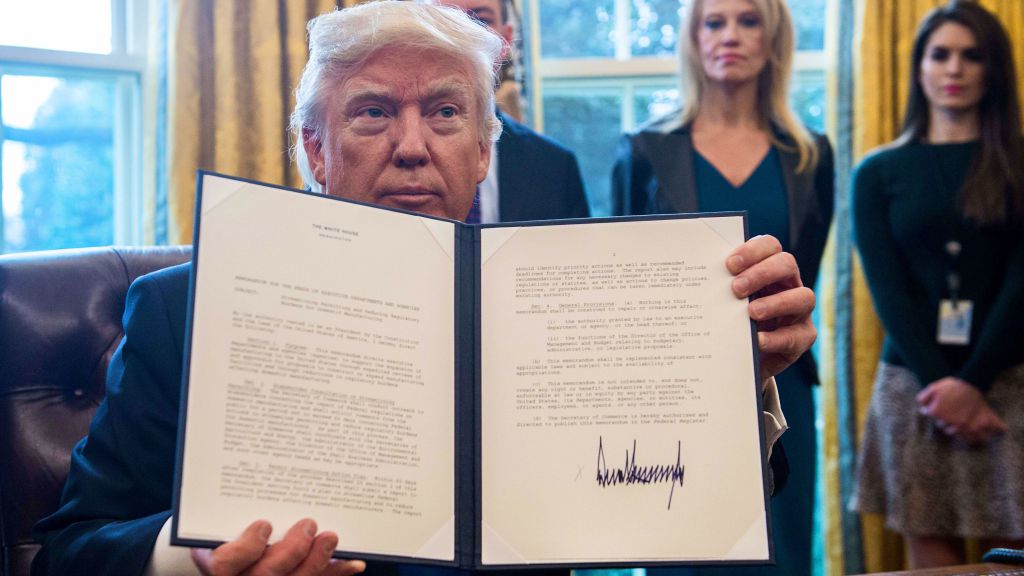Without Any Public Process or Regard for Native American Treaty Rights, Water Systems, Resources & Historic Properties, Trump [Yurugu] Granted Permits to Build the Keystone XL Pipeline - Suit Filed
/Pres. YURUGU Takes Executive Action On Keystone XL, Dakota Access Pipelines. DOC Blynd explains, YURUGU is a “a regressive (degenerative) state of consciousness where the soul is cut off from itself. 3) the inability to recognize or abate unacknowledged destructive capabilities. Yurugu also expresses itself and manifests as the pathological condition that utterly fails to convince those in geographical proximity of its harmlessness, therefore has to kill them. Yurugu is in a vicious spiral increasingly at odds with his own humanity—as fragmented, pathological, and distorted as it is.“ [MORE]
From [HERE] Two Native American communities filed a lawsuit [complaint, PDF] in the US District Court for the District of Montana [official website] on Tuesday alleging President Donald Trump’s administration will violate the tribes’ treaty rights when it permits TransCanada to build the Keystone XL Pipeline.
Former president Barack Obama rejected [JURIST report] the pipeline in 2012 and 2015 on climate change grounds, but President Donald Trump gave the project a green light shortly after his inauguration in 2017 via a presidential permit. According to the suit,
TransCanada’s permit applications had been denied two previous times, but on January 24, 2017, President Donald J. Trump signed a memorandum “invit[ing] TransCanada . . . to promptly re-submit its application to the Department of State for a Presidential permit for the construction and operation of the Keystone XL Pipeline.” Memorandum: Construction of the Keystone XL Pipeline, 82 Fed. Reg. 8,663, § 2 (Jan. 24, 2017) (“the Memorandum”). Unlike in the two previous permit applications, Defendants initiated no public process or environmental review of any kind for the third permit application.
Despite the lack of any public process and review, on March 23, 2017, the Department of State published its Record of Decision and National Interest Determination (“2017 Decision”). Plaintiffs’ Exhibit A; see 82 Fed. Reg. 16,467 (Apr. 4, 2017). Under Secretary of State for Political Affairs Thomas A. Shannon, Jr., granted TransCanada’s permit application and issued it a presidential permit (“the Permit”).
In granting this third application, Defendants reached the exact opposite conclusion as the previous administration on the very same record, in violation of the Administrative Procedures Act. 5. In granting this third application, there was no analysis of the trust obligation the federal government owes to the Rosebud Sioux Tribe and their unique water system, no analysis of the potential impact of the Pipeline on treaty rights, no analysis of the subpar leak detection system and the potential impact of spills on Rosebud Sioux Tribe’s members, and no analysis of the potential impact on the Rosebud Sioux Tribe’s cultural resources and historic properties in the path of the Pipeline, in violation of the National Environmental Policy Act and the National Historic Preservation Act [MORE]
The Fort Belknap Indian Community and Rosebud Sioux Tribe filed the lawsuit alleging Trump was precluded under the Administrative Procedure Act (APA) from granting the permit since the application was already reviewed and denied by the Department of State. The lawsuit also charges the administration with violating the National Environmental Policy Act (NEPA) and the National Historic Preservation Act (NHPA).
If not halted, the project will expand [WP report] the existing Keystone pipeline and would allow for the transmission of 830,000 barrels of crude oil daily from the tar sand producing regions of Alberta, Canada, to refining facilities on the Gulf of Mexico.







































































































































































































































































